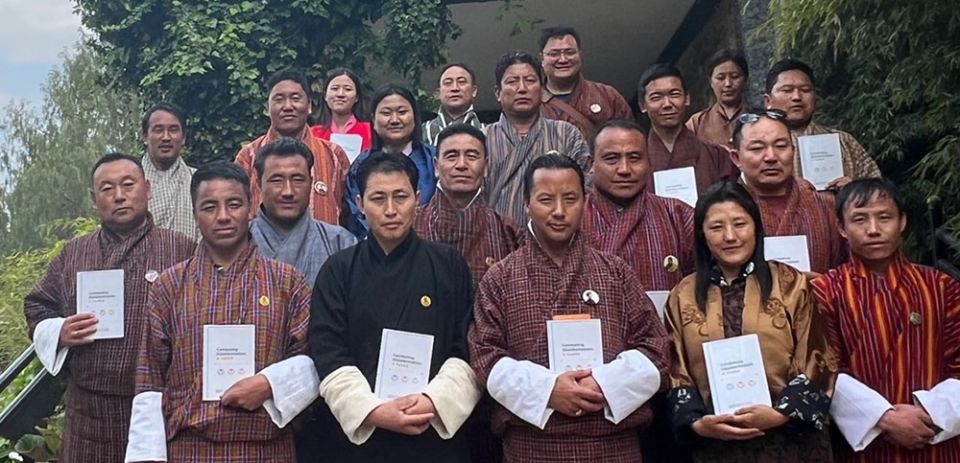
An ox swimming in Kabji Hoka Tsho, Punakha went viral on various social media platforms recently with many believing it to be a tsholang (mythical bull of the lake).
The man, who captured the 1.48-minute video, says seeing the tsholang swimming more than a kilometre across the lake is amazing. “It is gifted for the people like us to see such a mythical animal,” he says.
After viewing the short video clip, a group of people from Changyul visited Kabji Hoka Tsho yesterday and found the same ox loitering near the lake.
In March 2020, when the country reported the first Covid-19 case, the Paro dzongkhag administration distributed alcohol-based hand sanitizers to select households. Those who received it told their neighbours and other fellow farmers that it is similar to home-brewed alcohol. They even said that drinking alcohol can help prevent an individual from contracting the Covid-19 virus.
This was a relief for those drinkers and encouraged even non-alcoholics to drink. Today, some individuals have become alcoholics in the dzongkhag, according to some local leaders in Paro.
In another incident, an 81-year-old woman in Lungnyi gewog, Paro, stopped buying and eating imported packaged beef last year after hearing on social media that the product was mixed with horse meat. “My mother always advises us to make sure that we don’t bring packaged meat,” Lungnyi Mangmi Gyeltshen said.
Sometime in March this year, local leaders in Thimphu dzongkhag were shocked to see the post of Chang Gup Sonam Zangmo with her photo about getting an Australian visa. This was shared in the gups’ WhatsApp group. “I believed and called her immediately to find out why she was going to Australia,” Genekha Gup Kencho said.
According to Gup Sonam Zangmo, she shared a fake visa in their group to see the reaction of the elected local government leaders. “I received several calls from my friends after I posted,” she said.
These were some of the cases that 17 local leaders from Thimphu and Paro dzongkhags discussed during a day-long workshop on combating disinformation, fact-checking, and tracing sources of fake news in Paro last Friday.
Eight gups from Thimphu and a gup and eight mangmis from Paro admitted that such fake news, misinformation, disinformation, and mal-information are misleading people and creating disharmony in the communities.
“Even the mainstream media were giving false information,” Kawang Gup Dawa Tshering said referring to the news report where a reporter wrongly mentioned the place of pandemic outbreak in 2021.
Hungrey Mangmi Kinley Jamtsho said that the local leaders are sensitizing people to verify and cross-check before they believe in whatever people share on social media. “People are so gullible. That is why some individuals resorted to drinking alcohol believing that they won’t get Covid-19,” he said during the group presentation.
As per the World Health Organisation, drinking alcohol does not protect individuals against Covid-19 and can be dangerous as the harmful use of alcohol increases their risk of health problems.
Regarding the ox swimming at Kabji Hoka Tsho, one man clarified that the ox belongs to a farmer living near Choeten Nyingpa and not tsholang. The owner of the ox is clarifying to those visiting the lake not to spread rumours about the ox being mystical and that it was just an ordinary ox.
Kabji Hoka Tsho (lake with a hole) is one of the popular sites in Punakha for tourists. It is believed that the lake never overflows as it is continuously drained through an opening created by the deity residing in it.
Fake news, misinformation, and disinformation, according to UNESCO, form a part of the information disorder and have endangered trust in media and journalism. Increased digital access and the reach of social media platforms coupled with inadequate digital literacy have compounded the problem in networked societies worldwide.
With the increasing online population, Bhutan has witnessed expanding proportions of mal-information and Covid-19 has amplified this trend. According to Bhutan Media Foundation’s Social Media Landscape in Bhutan 2021, about 90 percent of the people are active members of at least one social media site, using it as their primary source of information.
A survey done by the Journalists’ Association Bhutan (JAB) found that Facebook is the primary site for encountering disinformation on social media, with word of mouth coming to a close second. Over 50 percent of the respondents also experienced disinformation on social media networks like WeChat, WhatsApp, Tik Tok, Instagram, and social media influencers. Traditional media such as newspapers, television, and radio scored better on the trust quotient.
With financial support from Helvetas Bhutan, JAB will conduct similar workshops at the College of Natural Resources at Lobesa, Jigme Namgyel Engineering College (JNEC) at Dewathang, Chumey Central School in Bumthang, and Rangjung Higher Secondary School in Trashigang from the third week of May.












